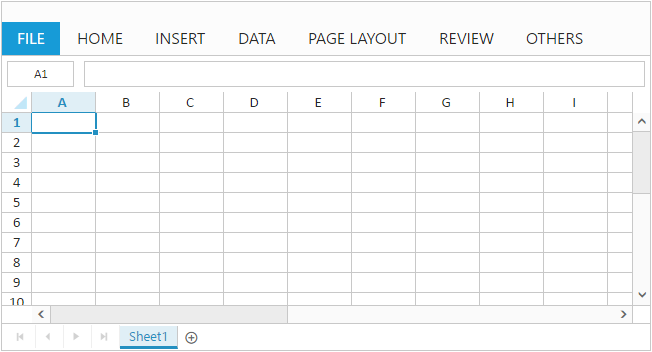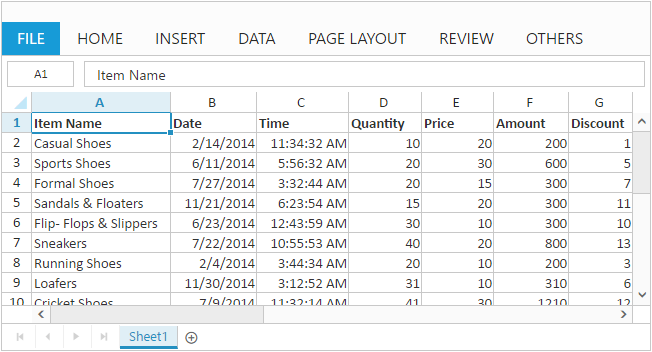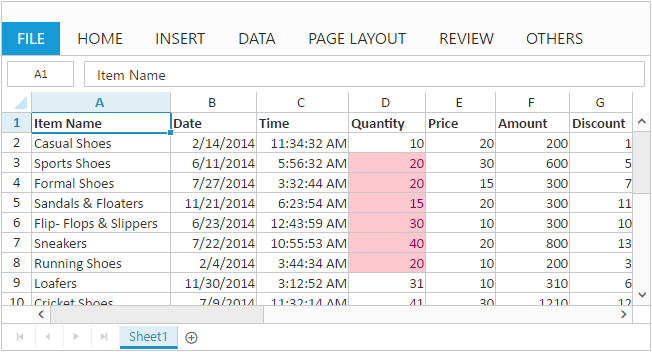Getting started
28 Jun 20177 minutes to read
Before we start with the Spreadsheet, please refer this page for general information regarding integrating Syncfusion widget’s.
This section explains you the steps required to populate the Spreadsheet with data, format, and export it as excel file. This section covers only the minimal features that you need to know to get started with the Spreadsheet.
Adding Script Reference
To render the Spreadsheet control, the following list of external dependencies are needed,
The required angular script as angular.min.js and ej.widget.angular.min.js which can be available in below CDN links:
-
angular.min.js- http://cdn.syncfusion.com/js/assets/external/angular.min.js -
ej.widget.angular.min.js- http://cdn.syncfusion.com/28.1.33/js/common/ej.widget.angular.min.js
For other required internal dependencies refer the link
NOTE
Spreadsheet uses one or more sub-controls, therefore refer the
ej.web.all.min.js(which encapsulates all theejcontrols and frameworks in a single file) in the application instead of referring all the above specified internal dependencies.
To get the real appearance of the Spreadsheet, the dependent CSS file ej.web.all.min.css (which includes styles of all the widgets) should also needs to be referred.
So the complete boilerplate code is
<!DOCTYPE html>
<html ng-app="defaultApp">
<head>
<!-- Essential Studio for JavaScript theme reference -->
<link rel="stylesheet" href="http://cdn.syncfusion.com/14.3.0.49/js/web/flat-azure/ej.web.all.min.css" />
<!-- Essential Studio for JavaScript script references -->
<script src="https://code.jquery.com/jquery-3.0.0.min.js"></script>
<script src="http://cdn.syncfusion.com/js/assets/external/jsrender.min.js" type="text/javascript"></script>
<script src="https://ajax.aspnetcdn.com/ajax/jquery.validate/1.14.0/jquery.validate.min.js"></script>
<script src="https://code.angularjs.org/1.4.0-rc.2/angular.min.js"></script>
<script src="http://cdn.syncfusion.com/14.3.0.49/js/web/ej.web.all.min.js" type="text/javascript"></script>
<script src="http://js.syncfusion.com/demos/web/scripts/xljsondata.js" type="text/javascript"></script>
<script src="https://code.angularjs.org/1.4.0-rc.2/angular-route.min.js"></script>
<script src="http://cdn.syncfusion.com/14.3.0.49/js/common/ej.widget.angular.min.js"></script>
</head>
<body>
</body>
</html>NOTE
In production, we highly recommend you to use our
custom script generatorto create custom script file with required controls and its dependencies only. Also to reduce the file size further please useGZip compressionin your server.
For themes, you can use theej.web.all.min.cssCDN link from the code example given. To add the themes in your application, please refer tothis link.
Initialize Spreadsheet
All the Essential JavaScript directives have been encapsulated into a single module called ejangular so the first step would be to declare dependency for this module within your AngularJS application.
The Spreadsheet can be created using ej-spreadsheet AngularJS directive and its properties can be defined using e- prefix followed by the property name.
The code example for defining controls in AngularJS is as follows,
<!DOCTYPE html>
<html ng-app="defaultApp">
<body ng-controller="SpreadsheetCtrl">
<div id="Spreadsheet" ej-spreadsheet></div>
</body>
</html>The Spreadsheet is rendered based on e-scrollsettings-width and e-scrollsettings-height property.
<!DOCTYPE html>
<html>
<body>
<script>
var syncApp = angular.module("defaultApp", ["ngRoute", "ejangular"]);
syncApp.controller('SpreadsheetCtrl', function ($scope,$rootScope) {
});
</script>
</body>
</html>Now, the Spreadsheet is rendered with default row and column count.

Populate Spreadsheet with data
Now, this section explains how to populate JSON data to the Spreadsheet. You can set dataSource property in e-sheets settings to populate JSON data in Spreadsheet.
<body ng-controller="SpreadsheetCtrl">
<div id="Spreadsheet" ej-spreadsheet e-sheets="sheetData"></div>
</body>
<script>
var syncApp = angular.module("defaultApp", ["ngRoute", "ejangular"]);
syncApp.controller('SpreadsheetCtrl', function ($scope,$rootScope) {
// the datasource "window.defaultData" is referred from 'http://js.syncfusion.com/demos/web/scripts/xljsondata.js'
$scope.sheetData = [{ rangeSettings: [{ dataSource: window.defaultData, startCell:'A1' }] }];
});
</script>
NOTE
For more details about
data bindingrefer followinglink
Apply Conditional Formatting
Conditional formatting helps you to apply formats to a cell or range with certain color based on the cells values. You can use e-allowconditionalformats property to enable/disable Conditional formats.
To apply conditional formats for a range use setCFRule method. The following code example illustrates this,
<body ng-controller="SpreadsheetCtrl">
<div id="Spreadsheet" ej-spreadsheet e-sheets="sheetData" e-loadcomplete="loadComplete" e-allowconditionalformats=" true"></div>
</body>
<script>
var syncApp = angular.module("defaultApp", ["ngRoute", "ejangular"]);
syncApp.controller('SpreadsheetCtrl', function ($scope,$rootScope) {
$scope.loadComplete = loadComplete;
});
function loadComplete(args) {
this.XLCFormat.setCFRule({ "action": "greaterthan", "inputs": ["10"], "color": "redft", "range": "D2:D8" });
}
</script>
NOTE
For more details about
Conditional Formattingrefer followinglink
Export Spreadsheet as Excel File
The Spreadsheet can save its data, style, format into an excel file. To enable save option in Spreadsheet set e-exportsettings-allowexporting option as trueand Specify e-exportsettings-excelUrl option to save documents using server side helper. The following code example illustrates this,
<body ng-controller="SpreadsheetCtrl">
<div id="Spreadsheet" ej-spreadsheet e-sheets="sheetData" e-exportsettings-allowexporting="true" e-exportsettings-excelurl="excelurl"></div>
</body>
<script>
var syncApp = angular.module("defaultApp", ["ngRoute", "ejangular"]);
syncApp.controller('SpreadsheetCtrl', function ($scope,$rootScope) {
$scope.sheetData = [{ rangeSettings: [{ dataSource: window.defaultData, startCell:'A1' }] }];
$scope.excelurl = "http://js.syncfusion.com/demos/ejservices/api/Spreadsheet/ExcelExport";
});
</script>Use shortcut Ctrl + S to save Spreadsheet as excel file.
NOTE